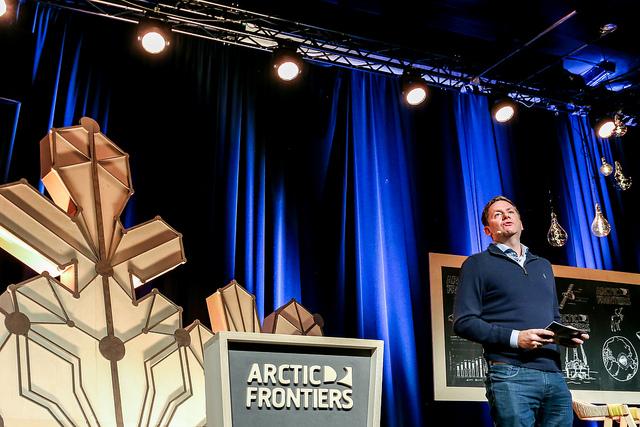When the “Completely Honest” Hurtigruten Uses the Police to Shield it from the Public

Daniel Skjeldam: A completely honest man. (Photo: Alberto Grohovaz/Arctic Frontiers 2019)
Commentary: While the British company Hurtigurten ASA pushes the police before itself as a shield and makes itself unavailable for public scrutiny, companies with North Norwegian roots deliver results that are out of this world. Even internationally, an arena where – sadly – Hurtigruten is still the company placing Northern Norway on the map.
Most undeserved, if you ask me.
Undeserved because Hurtigruten’s owners and management have demonstrated a business moral that is nowhere near what should be, and is, the standard in Northern Norway. The company caught global headlines when it violated infection control regulations and reintroduced corona infection as part of international cruise traffic.
What the manuscript says
Afterwards, they tried to cover up the infection outbreak. Until the company’s CEO Daniel Skjeldam entered the podium and read aloud from a manuscript saying that he was “completely honest”, as if there were degrees of honesty. He was in addition, the manuscript said, completely transparent – a term whose meaning can hardly have been understood by the manuscript’s author.
Because in the very moment the CEO had read aloud from the manuscript, the opposite happened. Transparency was replaced by opacity, which means quite the opposite. From then and until now, Hurtigruten’s management has blamed the police investigation when refusing to answer questions.
This is a high-class technical communication manipulation. The fact that a company is being investigated by the police does not absolve it of its right or duty to answer questions of interest to the public. The police track is an excuse to not be “completely honest” and transparent.
Antarctic cruises threatened
In addition to refusing to answer questions related to infection outbreak, it also has to do with the company’s ability to survive. In October, Hurtigruten starts its expeditions to Antarctica. According to the company home page, where tickets for these cruises are still available, a total of 23 expeditions with three different ships are scheduled. With an average of some 400 passengers and an average ticket price of NOK 100,000 (€ 10,000) per head, an economic abyss would open up if these trips have to be cancelled. An economic abyss for a company that already is in a nearly hopeless debt situation.
The utterly silent British majority owner pushes Norwegian minority owners like Trygve Hegnar and Daniel Skjeldam to the front. Hurtigruten appearing to be a Norwegian company is all about brand building. I can sympathise with the fact that the otherwise very vocal Trygve Hegnar appears muted. In his very first attempt to put out the fire, he made a mistake and refused to answer whether he as Chairman of the Board still trusted CEO Skjeldam.
If you are looking for news about Hurtigruten’s financial situation, Hegnar’s own newspaper is of little or no help.
Moving over to the young
For a brief while now, Hurtigruten has sailed into more lush waters as young people from the wealthier parts of Oslo have taken over the role of reckless infection spreaders. Unlike Hurtigruten, these youngsters have neither communication departments nor a communication strategy, so they are an easy target in the blame game when infection numbers increase.
I can sympathise with the fact that the otherwise very vocal Trygve Hegnar appears muted.
It is also a pity that Hurtigruten gets to grab the headlines in a time when North Norwegian companies pour out good news.
The good news
Nussir mining company in Kvalsund, almost at the northernmost top of Norway, Tuesday presented an agreement with German Aurubis worth NOK 10 billion and aims for 300 mining-related jobs locally. The mining project is still highly disputed, though all permits are in place.
And today, High North News broke the news that Nussir has chosen Leonard Nilsen & Sons (LNS) for development of the mine as well as underground mining. The contract extends for ten years with a prolong option and has an estimated value of some NOK 4 billion.
Sparebank1 Nord-Norge had an EBITDA of just over one billion NOK during the first half of the year, aided no doubt by solid interest rate margins and a North Norwegian population that pulls through no matter what.
At the same time, the money-making machine Torghatten ASA continues making money. This North Norwegian company is a giant in air and water based transport. This week, its subsidiary Torghatten Nord presented a result of NOK 240 million for last year.
And the icing on the cake; the Tromsø-based newspaper Nordlys this week announced that Lytix Biofarma has entered into an agreement with American Verrica Phamarceuticals. The company conducts research on cancer and through this agreement, it has come a step closer to the adventure every entrepreneur dreams of.
There are still northerners among the company owners. The biggest owner is property investor Terje Arnulf Johansen from Finnsnes on the island of Senja, and the contract with the Americans makes sure the cancer research treasure chests are filled to the brim.
Not the job of the police
My experience is that it is rather easy to enter into dialogue with North Norwegian businesses. Hurtigruten represents an exception when it, without any reason given, delegates its information responsibilities to the police.
That is certainly not completely honest.
This commentary was originally published in Norwegian and has been translated by HNN's Elisabeth Bergquist.

